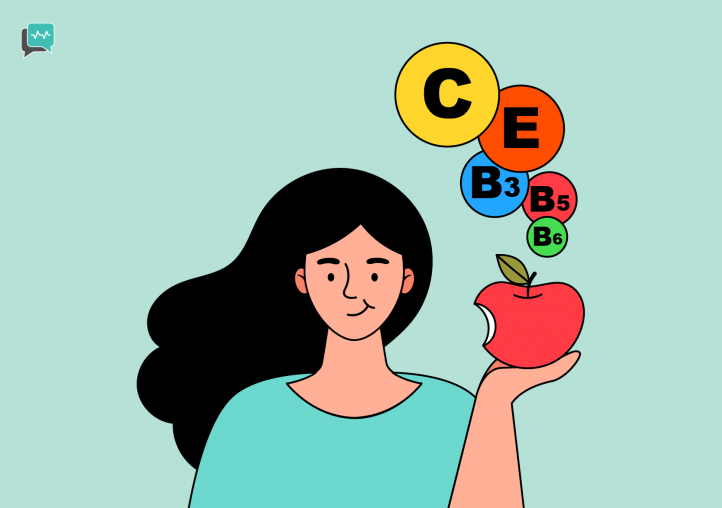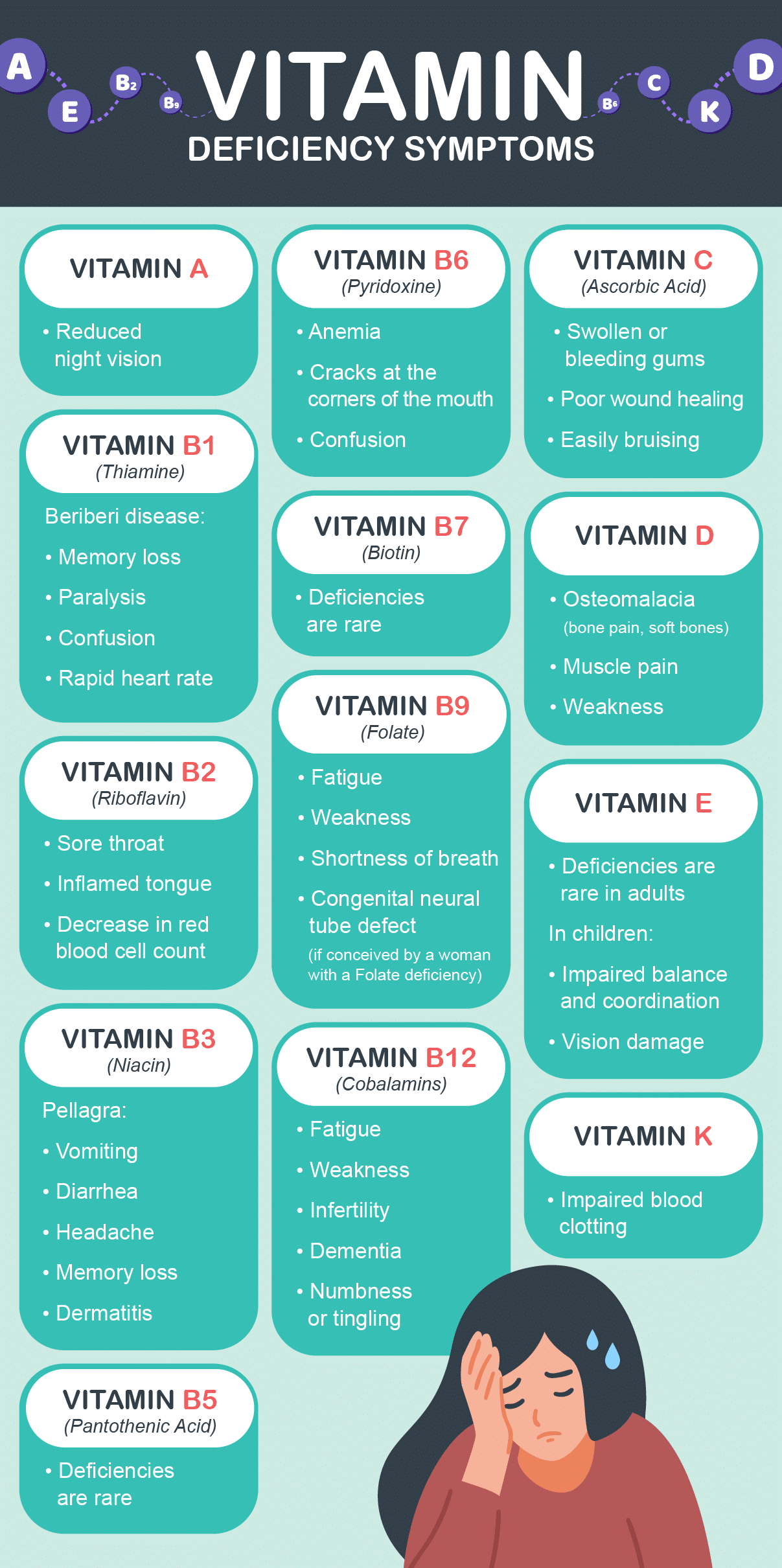All About Vitamins

Vitamins are organic compounds that play a role in everything our bodies do, including developing, growing, moving, digesting, healing, reproducing, thinking, breathing, fighting infection, and anything else you can think of. Although our bodies need only very tiny amounts of each of the thirteen vitamins, a deficiency in any one of them can have tragic consequences. In countries in which the variety or availability of food is severely limited, vitamin deficiencies are easily identifiable as the cause of certain irreparable or fatal conditions. In wealthier countries, vitamin deficiencies can be harder to identify. A deficiency might not be recognized or identified until a person feels unusually fatigued, gets more viral infections than usual, or has a wound that heals too slowly.
What happens if I have a vitamin deficiency?
Symptoms of a deficiency, and their severity, depend on which vitamin you have too little of, how deficient you are, and for how long you have been deficient in that vitamin. Symptoms of one vitamin deficiency can overlap with symptoms of another vitamin deficiency. Most symptoms have several possible causes. Without seeing your health care practitioner, it can be difficult to know if your symptoms are from a vitamin deficiency or from an entirely different condition. A few examples of symptoms caused by vitamin deficiencies are:

For more information on the symptoms and diseases resulting from vitamin deficiencies see LINK HERE.
How do I know if I am getting enough vitamins?
There are several ways to be confident that you are getting the recommended daily allowance of each vitamin.
- One way is to use the MyPlate method, based on the dietary guidelines recommended in the United States. In this method, you imagine a plate divided roughly into quarters.

- One of those quarters contains a protein, such as meat, poultry, fish, tofu, or legumes.
- Another quarter contains grains.
- The other two quarters contain fruits and vegetables.
- On the side of the plate is a glass of milk, cup of yogurt, fortified soy milk, or similar food from the dairy category.
Most of us would have a hard time matching each meal to these guidelines. However, ideally over the course of a day or even a couple of days, half of your food intake would come from the fruits and vegetables category, one quarter would come from the protein category, and one quarter would come from the grains category -preferably whole grains. Adult women should have the equivalent of three cups of dairy a day. The website MyPlate.gov has more specific information and excellent resources, including a smartphone app.

Most packaged foods have a label that states what percent of the recommended daily value of each listed nutrient is in one serving. In the U.S., Vitamin D is the only vitamin required to be listed. In the E.U. no vitamins are required to be listed. However, if the food in the package is a good source of a particular vitamin, the manufacturer may choose to include the amount of that vitamin on the label.
If you are interested in a more precise measurement, you can look on the internet for a chart showing the recommended dietary allowance of each vitamin for a person of your age and biological gender. Next, look up the amount of each vitamin contained in a standard serving of every individual food item that you eat. Finally, reduce or increase the amount listed for that vitamin so that it is in proportion to your actual serving size.

If you or your health care provider is concerned about your vitamin levels, ask what blood tests can be done, either to check your vitamin level or to diagnose a condition that could be related to a deficiency.
Why can’t I just eat what I want and supplement with vitamin tablets?

There are several reasons that scientists and health care professionals advise most people against taking vitamin supplements.
- With a balanced diet, most people can meet their nutritional requirements.
- Vitamin tablets are not a substitute for food. If you take a vitamin A tablet instead of eating a carrot, you will not get any of the other important nutrients that are in carrots. In addition to vitamin A, carrots contain thiamin, niacin, vitamin B6, folate, manganese, vitamin C, vitamin K, potassium, antioxidants, carbohydrates, dietary fiber, and numerous other substances necessary for good health.
- Some vitamin supplements should not be taken with certain medications. Make sure your health care provider knows about any supplements you take.
- Elevated levels of certain vitamins can be dangerous. Most vitamins, if taken in excess of “published tolerable upper limits,” can cause problems ranging from nausea to brain damage.
- Although vitamin supplements are sometimes government-regulated, tests have shown that supplements often contain less or more of the vitamin than advertised. If you do take supplements, ask your health care provider to recommend a reputable brand.
Should some people take vitamin supplements?
Vitamin supplements are actually necessary for many people, including people who eat nutritious, balanced meals. Some of the most common reasons for needing supplements include:
- Having a medical condition that raises the risk of a vitamin deficiency. For example, people with diseases affecting their intestines might not be able to fully absorb certain nutrients.

- Being a woman of childbearing age. Women of childbearing age should take folic acid if there is any chance at all that they might become pregnant. Folic acid protects against neural tube defects that develop in the embryo before a woman knows she is pregnant.

- Having macular degeneration, a disease that can cause blindness. People who have already developed macular degeneration are often advised to take a daily “AREDS” or “AREDS2” supplement. AREDS formulas provide specific micronutrients including high levels of vitamins C and D.

- Advanced age. Elderly people sometimes have difficulty meeting all of their vitamin requirements through food. Vitamins D and B12 are of particular concern.
- Following a vegan diet. Vegans (people who don’t consume any animal products) might need to supplement their diet with vitamin B12. Vitamin B12 is only found naturally in animal products, but it is sometimes added to cereals and some other foods. Vegans who don’t have access to B12-fortified foods should take a B12 supplement.
Fortunately, in developed countries, most vitamin deficiencies are preventable. You don’t even have to like the foods that are best known for providing a certain vitamin, because other foods contain that same vitamin. For example, you probably know that oranges contain a lot of vitamin C, but what if you don’t like oranges? Red peppers are actually higher in vitamin C than oranges are, and broccoli, brussels sprouts, strawberries, kiwifruit, and green peppers are also a few good sources of vitamin C. Each of these foods contains many different nutrients – and every bite brings you closer to fulfilling your body’s needs and keeping you in good health.
How Halza can help?
Manage your family’s health easily with the Halza app. Store, track & share all of your child’s medical records to have them with you, wherever you go. Monitor your child’s growth and vaccination schedule as well as upload reports and doctor’s notes all with the Halza app. QuickShare a complete overview of you or your child’s health with any attending doctor in seconds, during emergencies or whenever you need.
Simplify your health journey with Halza.